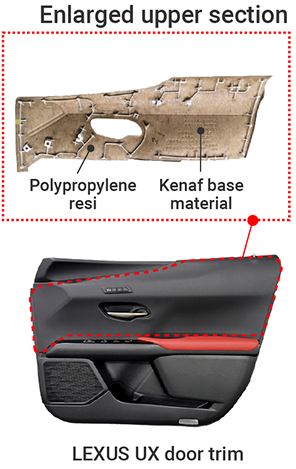Plant-based plastics will help to save the planet
Searching for plant-derived materials
A variety of materials are used in automobiles, including steel, aluminum, and plastic. Plastic is a strong and lightweight material, but petroleum-based plastics are often incinerated after use, which generates carbon dioxide (CO2) that is a cause of climate change. There is also the possibility of the depletion of oil, which is used as a raw material. For these reasons, there is strong demand around the world for alternative materials to petroleum-based plastics.
In this context, we, the Toyota Boshoku group, are promoting the substitution of materials through the use of plant-derived materials and the like, and are promoting environmentally friendly manufacturing. With the aim of reducing the life cycle CO2 emissions of automobiles, we have been developing products for more than 20 years using kenaf, an annual plant that grows rapidly and has a high CO2 absorption capacity. It has been adopted in automobile parts such as door trim base materials and air cleaner cases. The use of kenaf, a strong fiber material, as a reinforcing material also contributes to improved fuel efficiency (reduces CO2 emissions during driving) through lightweighting.


Toward a solution to the problem of marine plastics
Plastic waste in the world’s oceans is having a major impact on ecosystems. It is hoped that a material known as biodegradable plastic, which can be broken down by microorganisms and returned to nature, can help to solve this problem.
In collaboration with Iwate University, we are conducting research and development of biodegradable plastic using discarded seaweed such as wakame and kombu (species of kelp). Associate Professor Miwa Yamada of Iwate University has discovered a microorganism that produces plastic components within the body when fed alginate, the main ingredient of wakame and kombu. Through joint research, we have succeeded in extracting plastic components from this microorganism to produce a film that can be used for applications such as food packaging.
About 50,000 tons of wakame seaweed is harvested annually in Japan, but it has been reported that the unused portion of wakame seaweed during processing can account for as much as 60% of the harvest. In addition, in countries other than Japan, there has never really been a culture of eating seaweed, and the abnormal growth of seaweed due to climate change has made its disposal a major issue.
We are working to solve the problem of marine plastic litter and marine waste, which has become a social issue, by investigating the practicality of biodegradable plastics for film products. Biodegradable plastic is also carbon neutral because it can be disposed of without burdening the environment. We will continue to conduct research and development with the aim of application and commercialization at the earliest opportunity.



 Media site to convey the Toyota Boshoku group vision for the future and initiatives
Media site to convey the Toyota Boshoku group vision for the future and initiatives



